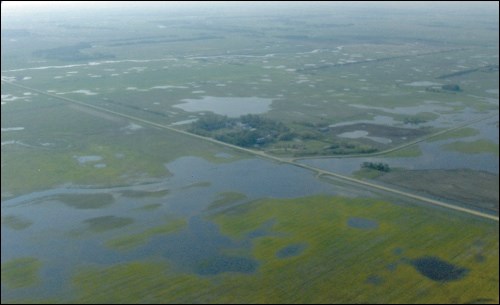The water keeps rising and another politician made an appearance in rural Saskatchewan.Ralph Goodale, the lone Liberal MP from Saskatchewan, was in the east-central region of the province on June 30, checking out the flood damage for himself. Goodale's tour, arranged by the Agricultural Producers Association (APAS), took him through the RMs of Prairie Rose, LeRoy, Lakeside, and Lakeview.Goodale's time in the RM of LeRoy had Reeve Jerry McGrath drive him around the RM to show him some of the worst of the flooding and the damage it has caused to roads and fields.The tour brought them back to the RM office in LeRoy for lunch and a slideshow of photographs taken from the air by RM councillors Calvin Michel and Calvin Buhs from earlier in the month. Several residents of the RM, city and RM councillors, and representatives of APAS were at the meeting.The photographs showed a landscape split between land and water, roads disappearing into water, and farmyards as islands surrounded by water. The slideshow had Goodale exclaiming, "Just incredible."Some of the water had receded since the pictures were taken on June 11 and June 19, but the recently exposed ground is still unworkable.Overall, Goodale thought the meeting went well and the tour gave him a fresh perspective on the flooding."When you look at it or hear about it or read about it, you get a pretty good impression that this is way beyond anything that could be considered normal or ordinary and seeing it just drives that point home," Goodale said. "Just mile after mile after mile of what would be some of the most productive farmland in the world just sitting there and people can't get at it. It makes it all very tangible and reinforces the point that this is a disaster for Saskatchewan and it also affects Manitoba and Alberta, and governments need to be very much plugged into the solutions. This is a circumstance that just cannot be ignored."According to numbers provided by the RM, they've received 13.97 inches of rain since April 1, while the 30-year average for the same period of time is 5.82 inches. Rainfall amounts vary widely across the RM this year, noted McGrath, with some areas receiving even more rain.The Town of LeRoy has also had problems with water, running pumps 24 hours a day for four weeks to try and move water along. The town had about 30 people report flooding issues, including the town office, which had eight inches of water in it at one time.Only about 35 to 45 per cent of the seeding in the RM was done this year and up to 25 per cent of what was seeded is now under water or washed out. Of the crop that is still growing, it is behind normal development and won't produce a normal crop."If we get 25 per cent of a normal crop, we'll be lucky," said Michel.The water is causing more problems than just not letting farmers seed their land or spray what was seeded. It is also causing problems with cattle, forcing farmers to look at selling part of their herds."We can't get at the hay to cut it and even if we bale it, how do we get it home?" one farmer at the meeting asked.Up to 70 per cent of the dirt roads and farm access roads are under water in the RM, McGrath said, making it impossible to move heavy equipment safely.With that explanation of the situation facing residents, Goodale asked what one thing would be most helpful.The answers ranged from improving the coverage on unseeded acres, to making sure that any payment covers seeded, unseeded, and hay land.
The current AgriStability program didn't meet anyone's definition of a program that would provide help quickly and efficiently, while the AgriRecovery program doesn't have any rules for implementation, Goodale noted."It is critically important for the government to get on top of this and get some answers," Goodale said.Any new program should be mandatory for every producer, said Garth Burns with APAS."We need a program that could get producers and government together to set out an easy-to-understand program," Burns said. "We need a program that will look after the long term. We can't go back every year to the government for help."While some people were worried about where the government was going to get money to help agriculture, most thought they should do it anyway."They found money for the (automobile industry), they should be able to find money for the agriculture industry," stated Michel.Goodale encouraged the people at the meeting to keep pushing for government help."This issue was very visible in early to mid-June, but now it's dropped off the agenda," he said. "Unless people are content to believe the existing programs will get them through this, you need to keep the message front and centre. The elected representatives of the Prairies need to speak up."While everyone agreed that farmers need some help in this crisis, everyone wanted a permanent program put in place."We need to get rid of the uncertainty," said Michel. "Don't rush in, do the program right."Goodale agreed, saying that the "government has to disassemble a multitude of programs and build a new one from the ground up that is clear and understandable and bankable.""Let's use this disaster to find more durable solutions that have better credibility and better buy-in for the long term."McGrath was pleased with the meeting, saying that they are just trying to get awareness of the situation and that people need to understand that there is a disaster happening.The RM has received notice that they are a designated area under the Provincial Disaster Assistance Program (PDAP), said McGrath, so now they are waiting for inspectors to look at the problems with the roads and estimate the costs for repair.The PDAP designation also means that residents who have had flooding issues in their homes or businesses can also apply for help.




